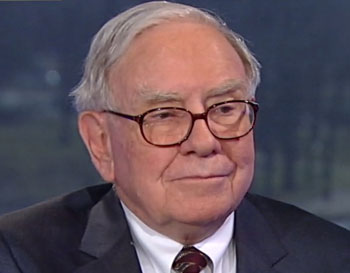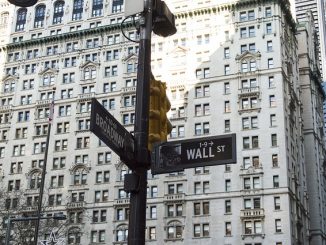 Oh my God. I never thought i would ever say this, but Warren Buffett has turned into an evasive, disingenuous, bumbling buffoon. I’ve just finished watching the beloved Oracle of Omaha being grilled by the Financial Crisis Inquiry Commission about the catastrophic role of credit rating agencies, and it’s pitiful to watch him plead ignorance on the most elemental questions about what Moody’s and Standard & Poors did wrong or how they should be changed.
Oh my God. I never thought i would ever say this, but Warren Buffett has turned into an evasive, disingenuous, bumbling buffoon. I’ve just finished watching the beloved Oracle of Omaha being grilled by the Financial Crisis Inquiry Commission about the catastrophic role of credit rating agencies, and it’s pitiful to watch him plead ignorance on the most elemental questions about what Moody’s and Standard & Poors did wrong or how they should be changed.
This is the same Warren Buffett who has been all but canonized as a saint for his adherence to long-term value investing, his folksy candor, his opposition to Wall Street gimmickry and not the least for his memorable description of financial derivatives as “weapons of mass financial destruction.”
Where have you gone, Joe DiMaggio?
To the bank, apparently. Buffett’s Berkshire Hathaway owns a hefty chunk of Moody’s Investor Service — somewhere around 13 percent — and he only appeared today after being subpoenaed by the commission.
The corruption and/or incompetence of the rating agencies has been documented so extensively — and reinforced again today by two Moody’s whistleblowers — that it needs almost no repeating. Moody’s, S&P and Fitch all made fortunes by handing out AAA ratings on about $2 trillion worth of securities backed by junk mortgages and worse. On a typical pool packed — no money-down mortgages to borrowers with bad credit histories who were allowed to lie about their incomes — the rating agencies merrily gave AAA ratings to tranches accounting for 85 to 90 percent of investors’ money. They did the same thing for “mezzanine CDO’s,” which were made up of the toxic waste tranches from all those pools. And they also gave AAA’s for billions worth of “synthetic” subprime CDO’s, that were sometimes designed by investors like John Paulson who wanted to bet on their failure.
Yet when asked by Phil Angelides, the commission chairman, what the agencies did wrong, Buffett passed the buck as shamelessly as every other Wall Street powerhouse player: “I think they made the same mistake that virtually everybody else made,” Buffett told in the first in a long series of evasions. That “mistake,” of course, was in failing to recognize that the housing bubble might turn to a bust. When Angelides held up a copy of the Economist from 2005, which featured a cover story on housing called “After the Fall,” Buffett stuck to his story. When Angelides mentioned some of the economists who had warned for years about a housing bust Robert Shilling, Nouriel Roubini and Dean Baker, among others — Buffett still shrugged his shoulders.
“Looking back on it, they didn’t recognize it, I didn’t recognize it, most people didn’t recognize it,” he said more than once.
When Buffett was repeatedly asked what he would change about the structure of the ratings agencies to reduce the conflicts of interest caused when bond issuers pay the agencies for their ratings, the great sage seemed nonplussed. “It gets tricky,” he said at one point. “It’s hard to come up with an alternative,” he said later.
As it happens, the Senate included one alternative in the giant financial reform bill that passed last month: an amendment by Sen. Al Franken that would have the SEC set up a process for approving rating agencies and then handing out specific assignments to the agencies in something like a rotation system. The agencies would suddenly have no incentive to lower their standards in pursuit of market share. But Buffett offered no opinion on that or any other proposal.
Having basked for years in public adulation for his investment brilliance (he picked up a big chunk of Goldman Sachs (GS) at bargain basement prices at the peak of the crisis), Buffett suddenly acted as if he hadn’t the slightest idea about the goings on at Moody’s (MCO) even though Berkshire Hathaway had been one of its biggest shareholders.
“I’m not in a position to judge,” he answered, when asked whether Moody’s management or board had made major mistakes. Not surprisingly, this was unsatisfying to Angelides as well as to several other commissioners, including Douglas Holtz-Eakin, a top former economic advisor to President George W. Bush and John McCain.
But when they pressed him on why Berkshire Hathaway (BRK.A) hadn’t been more alert to the mounting problems, or why he didn’t have any ideas for fixing it, Buffett went blank.
“We own a lot of Procter & Gamble (PG), but I don’t know much about the inner workings of Procter & Gamble,” he said. Same thing with Johnson & Johnson (JNJ), which is under fire from regulators for manufacturing problems with children’s pain-relief medications and is under investigation for an alleged “phantom recall” of Motrin.
Well shucks. Who could ask for anything more?
- Bulenox: Get 45% to 91% OFF ... Use Discount Code: UNO
- Risk Our Money Not Yours | Get 50% to 90% OFF ... Use Discount Code: MMBVBKSM
Disclaimer: This page contains affiliate links. If you choose to make a purchase after clicking a link, we may receive a commission at no additional cost to you. Thank you for your support!




Other than a bunch of investing midgets taking their shot at the investing giant, I see little in this and other articles of this ilk worth reading. This is merely political "bread and circuses" which the author has gracefully decided to take the part of the "financial mob" happily pointing their fingers and filling their stomach while the politicians throw out sacrificial lambs for their amusement. Wonder what Buffett's attorneys [yes, they have legal advice even in Omaha] told him to do and say during this inquisition? Bet it was say little of importance, pretend you didn't see this coming, and don't mention you have been selling your shares of Moody's for a year now! You might want to access some of his writings on the Berkshire website to see what he has been saying about Moody's.
If you put Buffett on a pedestal, then that is your problem not his. Or more likely you created a straw man argument that had him on the pedestal so you could kick him off. Either way it is poor analysis and less than stellar thinking.